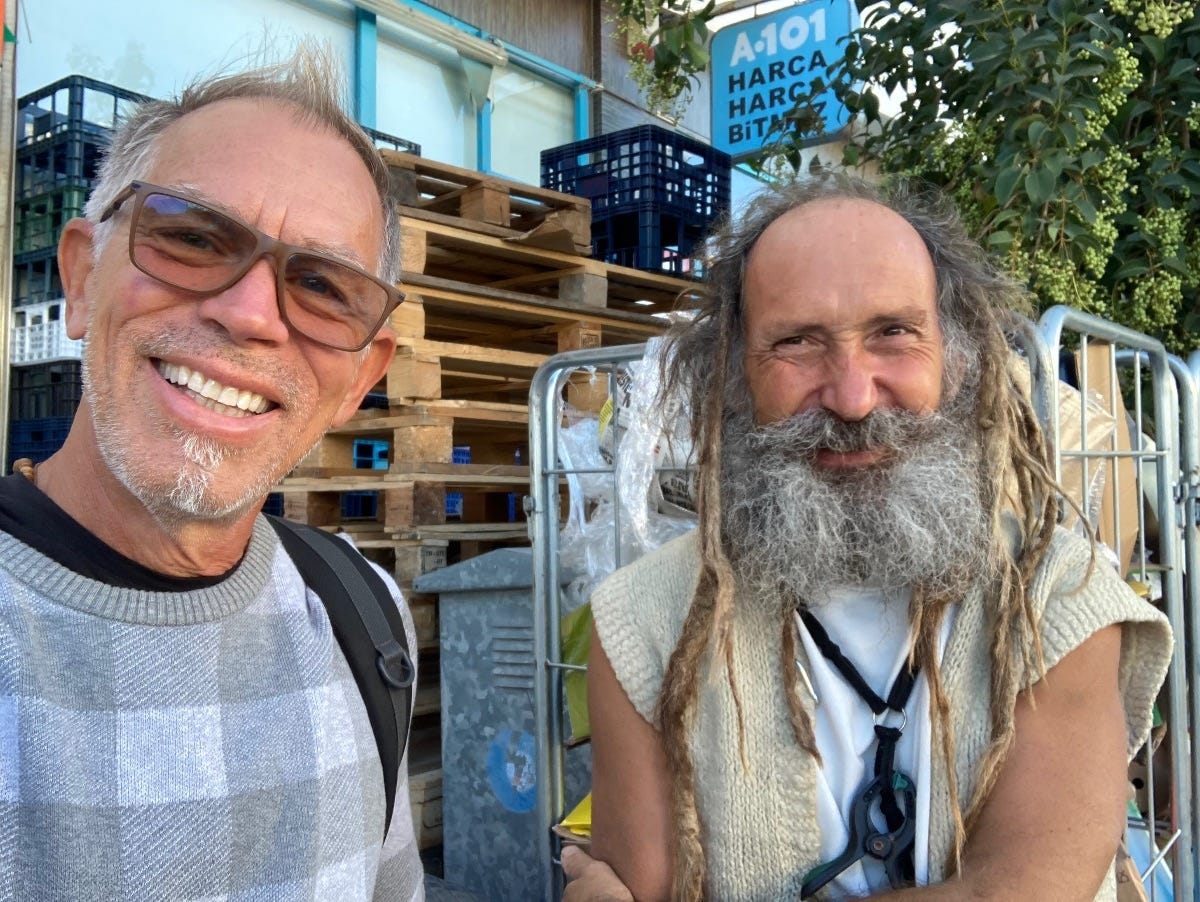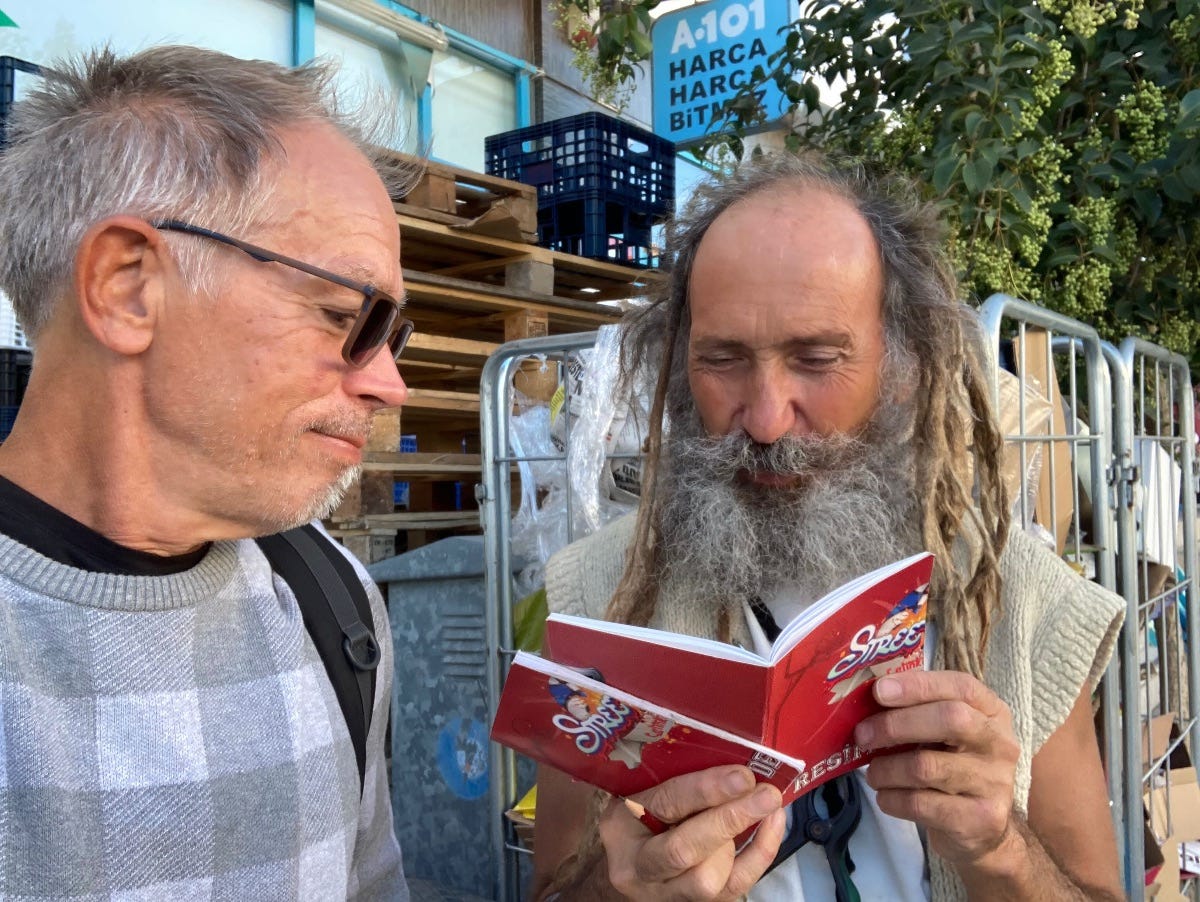Dear Reader:
Summer is wrapping up and giving way to a golden autumn here in Türkiye. The season is as sweet and perfectly ripe as the softball-sized, juicy peaches I buy from the local farmer’s market. I know both summer and the peaches will be gone soon enough, so I savor every warm and delicious taste of them. They taste like my childhood.
Fabi and I spend lazy days looking for the prettiest colored stones on the beach, or visiting dear old friends on their flower-trimmed patios, talking over a bottle of wine (or two) late into the cool Mediterranean evening.
A raucous chorus of locusts sings from the lemon trees while a yellow, gibbous moon rises over the dark sea. Our dogs, Chocolate and Vanilla, sleep through the heat of the day, and howl and prowl through the starry nights.




It’s a good time to reminisce, prompting me to dig into the Dance archives for a story I told a few years ago, and that I am retelling now. In it, you’ll meet a very special person.
I’ve freshened up the story some, and it remains one of my favorites from my years living in Türkiye. It also brings back happy, albeit quirky memories of my dear mom.
It’s what I see today…
From the Balcony
It was the laughter that caught my attention — long, loud, hearty guffaws that resounded through the sleeping city, echoing off its stone walls and concrete canyons, and wafting like merry smoke up to my high perch on the mountainside, where I sat nursing a coffee and watching dawn bloom like a pink and orange rose.
I had to pay attention to the laughter, for early morning was the time I chose to make the audio recording of my book “Blue Skyways.” Any ambient sound — laughter, birdsong, the creak of a sailboat, a cat’s yowl, or the putt-putt of the water delivery man’s scooter could, and often did, make it onto the recordings.
I didn’t mind those sounds. They add character, I thought. But insane laughter? That would be a distraction.
But who was responsible for this strange laughter, I wondered. And what was so funny?
I made it my mission to find out. That’s how I met Harkan.
I had seen the man a few times in the city. He’s a bit hard to miss. Tall and angular, he has a tornado of long gray dreadlocks dangling from his balding crown like a deranged octopus, a Rip Van Winkle gray beard, a lean face, and dark, penetrating eyes.
But it was his garb that really caught my attention. Harkan wears what can best be described as a one-piece miniskirt, its hem held down by black straps attached to his shoes. His bony legs are bare, as are his skinny arms.
Harkan adorns this dress with a utility belt that would make Batman jealous. Using a system of strings and clips that run from his waist to his neck, Harkan keeps with him everything he thinks he might need for the day.
Here is a short video of Harkan in one of his classic outfits.
I was determined to meet this curious-looking man, so I asked around town. Who is he? What is his story?
“Oh, that’s Harkan,” most people would say. “He’s crazy.”
Who You Callin’ Crazy?
I view “craziness” as a fluid, non-binary thing. No one is completely crazy, and no one is entirely sane. We are all somewhere on the continuum.
I hold this view for reasons of self-preservation. I have been told, by several people who know me, that I am certifiably “on the spectrum.” I have learned to accept this about myself; in fact, I consider it to be one of my lovable eccentricities, part of what makes me who I am. If I were to believe anything else, it would drive me, well... crazy.
“Be yourself. Everyone else is taken.”
Oscar Wilde
I also believe so-called “crazy” people are quite possibly in possession of secrets hidden from the rest of us.
For example, the science fiction author Philip K. Dick wrote a story about an old man sitting on a park bench, apparently muttering to himself. Most people passing by just ignored the geezer as another homeless nutcase. But as it turns out, the man is a decorated veteran, and his mutterings are about a war that will happen in the future. He has been sent back in time to warn us, if only we would take the time to listen.
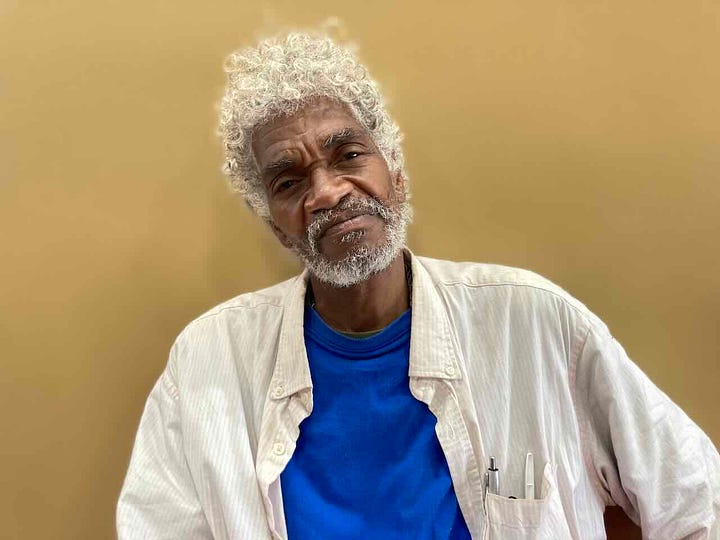
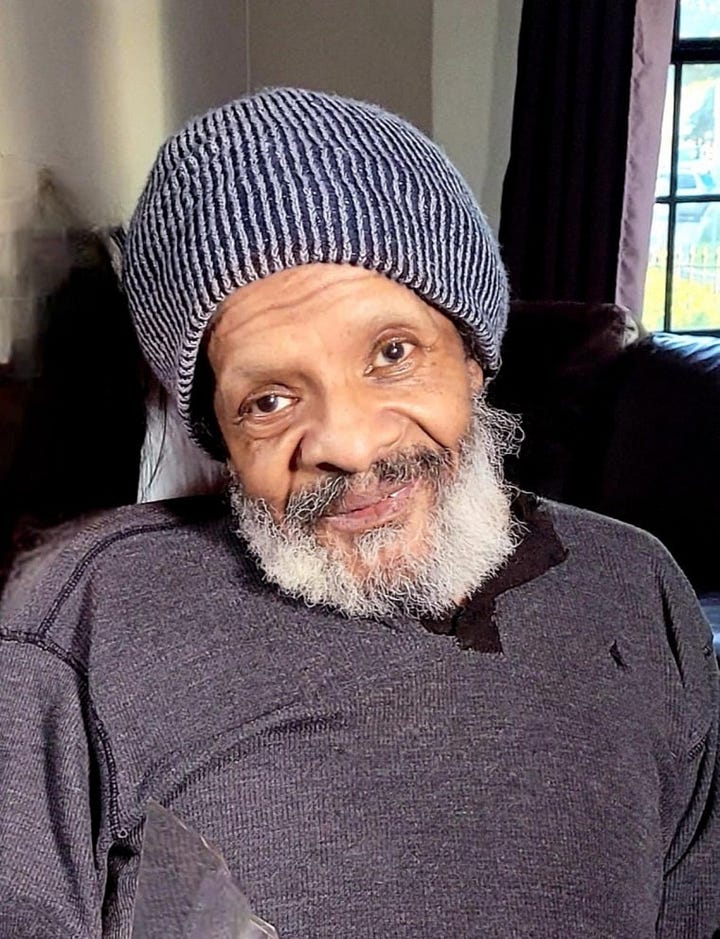
And so, when I finally had the opportunity to meet Harkan in person, I did so with an open mind. I was not surprised to learn, given Harkan’s appearance and antics, that he is undoubtedly one of a kind, unique in every way.
Harkan is, like me, “on the spectrum,” although I respectfully submit he is further along the continuum than I am, or at least I want to believe so. He is exceedingly friendly and outgoing. He’ll talk your ear off if you have the time!
Conversations with Harkan, however, are challenging. He is not easy to talk to. I will explain why I think so in a moment, but first, I want to convey some of what I learned about the man as I got to know him.
Harkan the Engineer, Polyglot, and Fashion Stylist
Harkan was born in 1963 in Türkiye and spent his formative years in Germany, where he became fluent in both German and English. He also speaks Turkish, making him a polyglot. Because I also speak some German, when I talk with Harkan, we use a mix of German and English, along with a smattering of Turkish.
I learned that Harkan graduated from Boğaziçi University with a degree in mechanical engineering. Boğaziçi, also known as Bosphorus University, is one of Türkiye’s oldest and most prestigious universities.
Harkan’s chosen field of study partially explains his odd attire, as it is highly utilitarian and not weird at all if one looks at it through the eyes of an engineer, which I can do, because, coincidentally, I also hold a Bachelor’s degree in Mechanical Engineering.
We engineers are not known for our fashion sense or social skills. Here is a joke my dad used to tell. He was also an engineer.
Q: How do you recognize an engineer with social skills?
A: When talking with you, he stares at your shoes instead of his own.
In addition to sewing his own dresses, Harkan makes hats by simply folding a square piece of felt in half and tying it with a string under his chin. It looks strange as hell, but it works perfectly well at protecting his balding head from Türkiye’s brutal summer sun without flying away in her strong coastal winds.
Harkan the Artist and Architect
Harkan is also an artist, creating attractive graphic designs featuring numerous interwoven patterns of trees, nude women, words, and more. You can see one of them in the picture shown below.
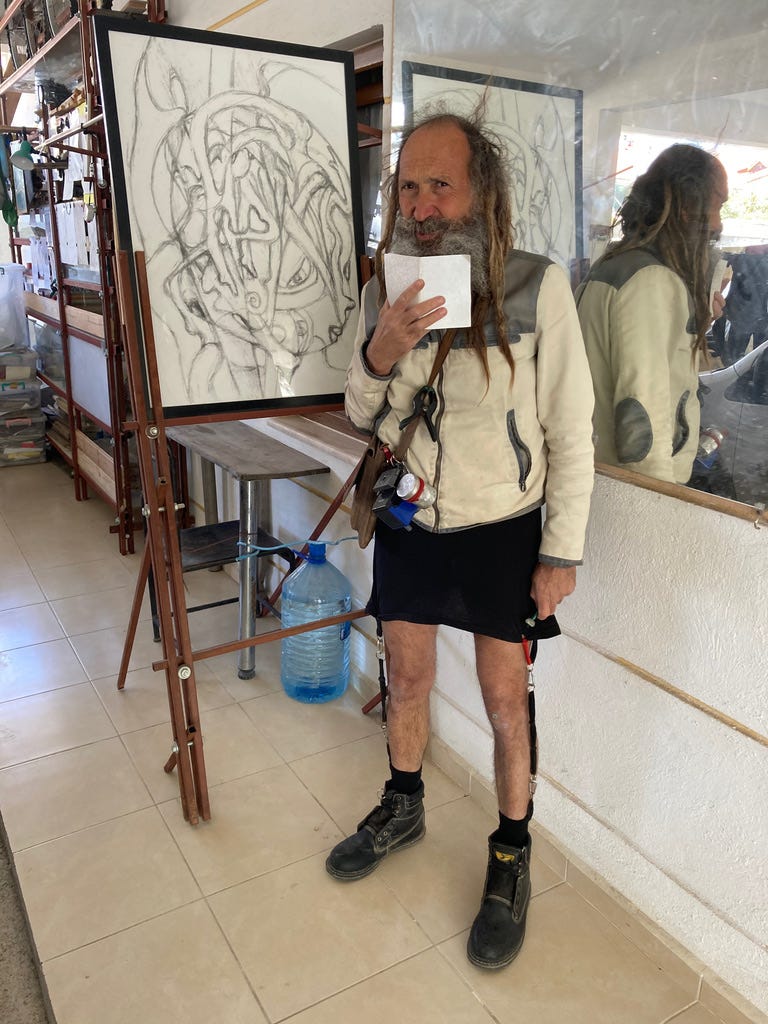
Harkan also designed and built his own house, and I have been invited to visit. I expect to find a structure that is part Hobbit hut, part Dr. Seuss, and part Buckminster Fuller.
A Beautiful Mind
Have you ever seen the movie “A Beautiful Mind,” based on the true-life story of the American mathematician and Nobel Laureate John Nash, played by Russel Crowe?
There is a shocking scene in the film when the door to Nash’s lab is opened, and we see a spider’s web of strings criss-crossing the room, revealing the mathematician’s obsession with finding patterns. That kind of obsession reminds me of Harkan and explains a lot about his unusual way of communicating.
For example, if I were to say to Harkan, “Hello. My name is Brant,” Harkan’s mind would spin off on words that rhyme with or are somehow related to what he heard. This is how he might respond:
“Brant? Like ant, or grant? I grant you permission to speak. Hahahaha! [scribble scribble scribble in his notebook] Or Willy Brandt. He was the Chancellor of Germany; I grant that you, Brant, are not that Brandt, but another Brant, and not an ant. Hahahaha!”
And so forth and so on, unless you stop him.
You can hear a brief snippet of a conversation I recorded (with Harkan’s permission) in the audio below. Note how he looks for patterns in the birthdays.
Harkan the Chess Champion
Finally, and this is important, I learned Harkan was Türkiye’s national chess champion in 1991, 1992, and 1994. When I discovered this about the man, I had an “aha” moment. You see, Harkan’s brain is wired to find patterns in everything he sees and hears. This is what made him so good at chess! But it also overwhelmed him, and sadly, Harkan spent many years in a mental institution.
Worms, anyone?
I recognize this type of pattern thinking from my mother, who was not quite as wacky as Harkan, but surely also “on the spectrum.” Like Harkan, Mom was excellent at seeing patterns and relationships in what the rest of us would consider disparate, unconnected things. Her mind was often several moves ahead on the “chessboard of life.” It made for some strange conversations.
I remember one time when Mom and I were having dinner together at a swanky restaurant, complete with a white tablecloth, an arsenal of silverware, a phalanx of crystal glasses, a snooty European waiter… you know, the whole nine yards.
When the main dish was served, I tasted it and said, “Hmmm. It’s good! Isn’t it, Mom?" Her response made me want to crawl under the table and die. She blurted out, rather loudly, “Yes, and your brother had pinworms!”
Yikes! How embarrassing!
Mom’s outrageous comment made sense (kind of) but only with some ‘splainin’.
You see, the dish we were served was heavy on the garlic, and eating garlic is (apparently) a natural way to rid oneself of pinworms, which my brother was unlucky enough to have had when he was a tyke. So Mom bounced three times, from dish to garlic (1), from garlic to remedy (2), and from remedy to worms (3). Voila!
Once I realized this about Mom, conversations with her became a lot more enjoyable and even fun. She was known to make eight or nine jumps at a time — quite a brain twister — and you could easily get confused if you did not understand her logic.
I bet Mom would have made a hell of a chess player, able to think through and “see” the myriad of moves and countermoves far ahead in the game. I can also see why she also drove my dad nuts, but that’s another story.
So is Harkan crazy?
Well, a psychiatrist with a PhD (which at least one of you is) would likely say Harkan has a mental health condition, and I admit I find him quite kooky. But I enjoy seeing the method in his madness!
Remember his crazy laughter? There is such a thing as “laugh therapy,” where people intentionally force themselves to laugh. I’m not sure I could do it, but I’ve heard it’s very healthy for the soul.
And remember Harkan finding patterns in the birthdays? Numerology is the pseudoscientific belief in a divine or mystical relationship between numbers, and some people (especially my former colleagues in the Evangelical Christian Church) look for all sorts of meaning in Biblical numbers. And they are quite sane…are they not?
And Harkan's appearance? He would make the perfect frontman for a rock group!

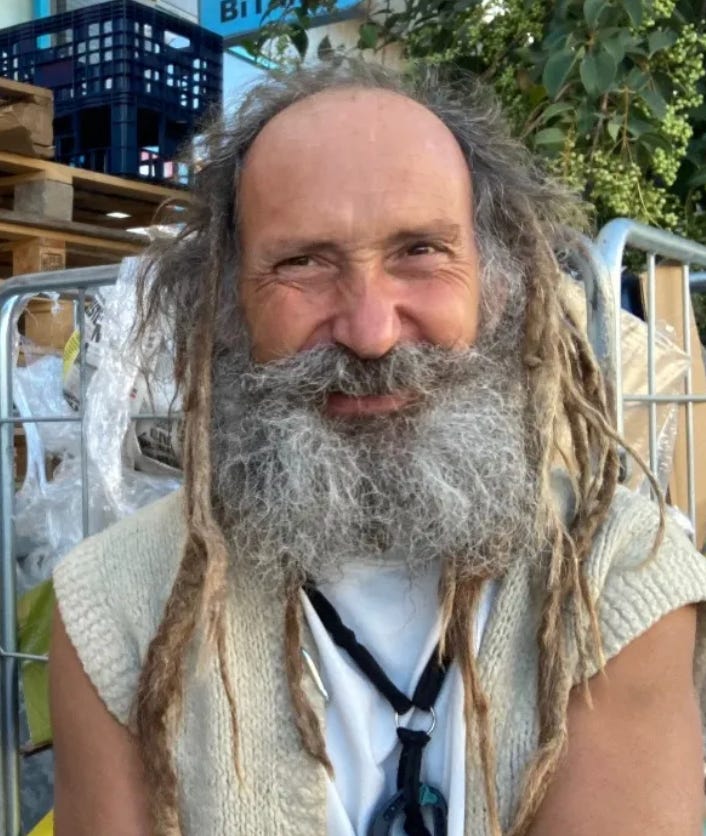
So Harkan is on to something after all!
That’s a Wrap!
I like people like Harkan. He’s both unique and authentic.
I also cherish my own brain just the way it is, with all its weirdness and eccentricities. I hope you love yourself as well, just as you are. After all…why be normal?
The singer Seal said, “We are never going to survive if we don’t go a little crazy!” So join me, Mom, Harkan, and the rest of our Homo Sapiens clan, and go a little nuts today. Let’s have some fun while summer lasts!!!
With love,
Brant
Post Script
You’ll note I did not sign off with my usual guitar signature. That’s because I woke up this morning to discover that both my phone and computer are severely crippled due to technical reasons. This will limit access to both, and to my regular distractions.
Oh well. It’s a sign. The limitations will force me to focus on one of my missions for 2025 — cleaning up my first book, “Map of Dreams,” a novel. Here’s what it’s about:
When Ph.D student Brian Drecker uses advanced software to analyze dreams from around the world, he discovers odd, unexplainable patterns in the data. Where one dream ends, another begins…even though the dreamers are strangers. Unique, identical objects appear again and again.
The software reveals that the patterns are a map pointing to an ancient, lost object. Brian uses the map to find the object, but is suddenly murdered, leading his deadbeat brother and estranged wife on an international race to recover the map’s buried treasure.
Along the way, the troubled couple is opposed by dark forces of the religious underworld, who launch a global pandemic to ensure the secret of the Map of Dreams remains hidden forever.
Ha! I wrote that one in 2006, long before anyone had heard of Wuhan or COVID-19. Spooky, ain’t it? I plan to have the new edition ready by Christmas.
Anyway, if you want to know more about the audio version of my third book, “Blue Skyways,” that I mentioned at the top of this letter, check out this video:
Thanks for following along!


